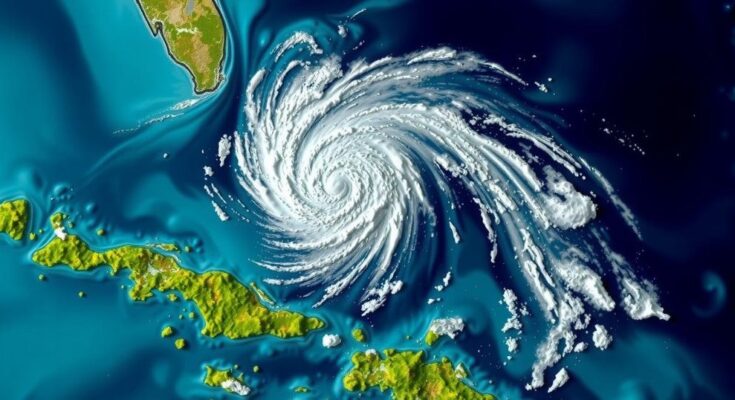Tropical Storm Oscar has disintegrated while heading towards the Bahamas after making landfall in Cuba, where it caused the deaths of at least six people and substantial flooding. The storm was historically the smallest hurricane recorded and highlighted forecasting failures. Moving forward, the Atlantic hurricane season may see further storm development, according to meteorological forecasts.
Tropical Storm Oscar has officially dissipated as it moved towards the Bahamas, having previously made landfall in Cuba as a Category 1 hurricane. The storm resulted in tragic casualties, with at least six individuals reported dead due to its impact in Cuba, where it also caused significant flooding, particularly in the Guantánamo region. Reports indicate that parts of eastern Cuba received upwards of 15 inches of rain, prompting warnings for potential flooding and landslides. As Oscar traveled northeast, its remnants were tracked approximately 75 miles east-southeast of Long Island in the Bahamas, with sustained winds decreasing to 35 mph. Oscar distinguished itself by being the smallest hurricane ever recorded, with a relatively narrow wind field of just about 6 miles. This unexpected development caught meteorologists off guard, as predictions had not indicated any strengthening of the storm prior to its landfall. Michael Lowry, a noted hurricane specialist, asserted, “It’s not often we see a colossal failure in hurricane forecasting,” underscoring the rarity of this oversight. While Oscar brought devastation to Cuba, it coincided with ongoing recovery efforts from a significant power outage on the island, resulting in protests against the government’s handling of the situation and subsequent warnings of strict repercussions for civil unrest. In terms of future forecasts, models suggest the possibility of another storm forming in the central Caribbean in the near future, as the Atlantic hurricane season, which began on June 1 and runs until November 30, remains above average this year. The National Oceanic and Atmospheric Administration (NOAA) predicts up to 25 named storms and several major hurricanes during this season. Concurrently, Tropical Storm Kristy continues to develop over the Pacific Ocean, located around 470 miles west-southwest of Acapulco, Mexico, with expectations to reach hurricane strength soon.
This article discusses Tropical Storm Oscar, which transitioned from a Category 1 hurricane to its remnants while moving toward the Bahamas. The storm caused at least six fatalities in Cuba, primarily due to severe flooding from extensive rainfall. The phenomenon is notable for its record as the smallest hurricane ever documented, leading to unexpected outcomes in forecasting practices. The article situates Oscar within the larger context of the ongoing 2023 Atlantic hurricane season, which has been marked by above-average storm activity influenced by unusually high ocean temperatures. It highlights the interplay between natural disasters and socio-political dynamics in Cuba, underscoring the compounded challenges faced by the island’s population amid infrastructural issues. Furthermore, it discusses potential developments in storm activity in the broader Caribbean region.
In summary, Tropical Storm Oscar serves as a significant example of the unpredictability inherent in meteorological forecasting, having resulted in loss of life and environmental damage in Cuba before dissipating toward the Bahamas. The record-setting characteristics of the storm, coupled with ongoing recovery challenges in Cuba, illustrate the complex relationship between natural phenomena and societal impacts. The article also raises concerns about the sustained activity of the Atlantic hurricane season and its potential implications for future storms in the region.
Original Source: www.stripes.com




